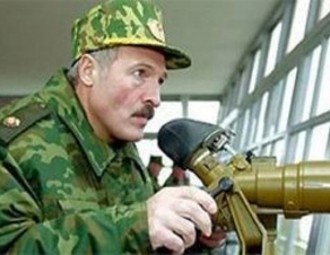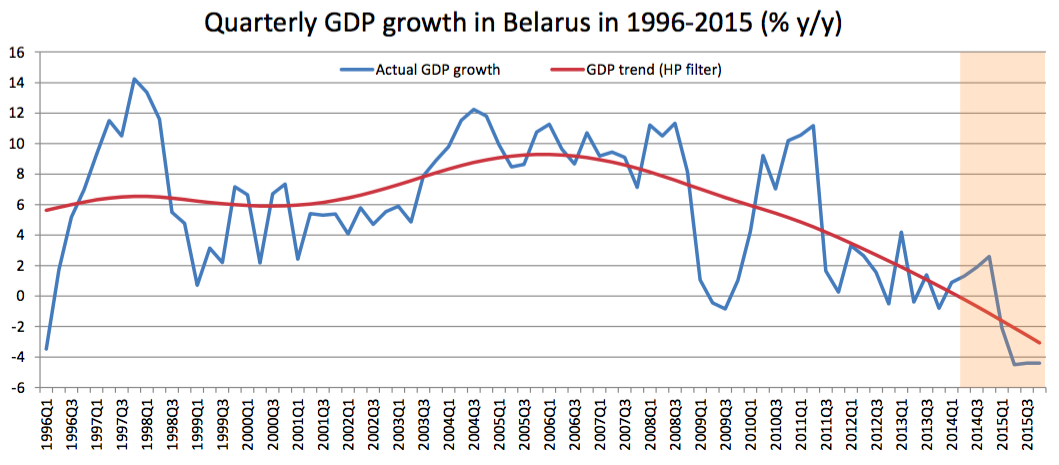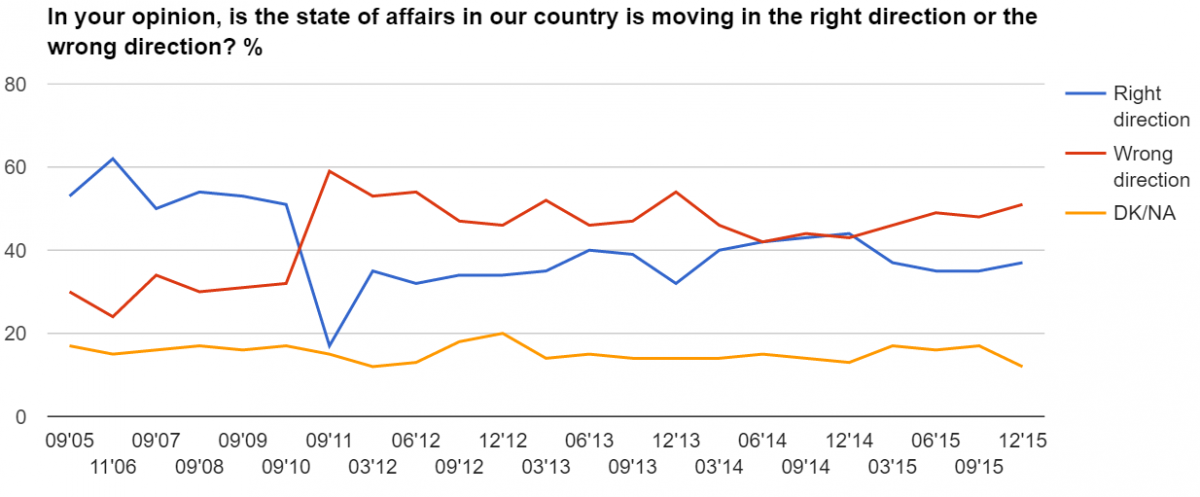Now Lukashenka's position seems to be strong, but the next five years appear to be a real challenge

It was easy for Lukashenka to introduce authoritarian regime policies when the economy was growing; but the worse state policy gets, the greater the tensions between him and the establishment will be.
On 11 October 2015 it was officially revealed that Aliaksandr Lukashenka had won his fifth presidential election. Five months post-election it appears obvious that it is set to be his most difficult term in office.
Despite a very vague electoral manifesto, the Belarusian state leader has already managed to break some of his promises. For instance, the platform promised that the government would not introduce any new taxes over the next five years, but the authorities have reneged on this promised and already passed several laws introducing new taxes.
What makes this situation even worse is that Lukashenka seems to lack any real plan on how to resolve the crisis, a strategic weakness which may lead to the greatest fall in his electoral support rating.
Lukashenka’s electoral manifesto: promises already broken in several areas
Unlike the manifesto for the 2010 election year, Lukashenka’s team wrote a rather vague manifesto programme for the last election. It lacks the outlining of specific goals and focuses on unclear notions of peace and independence. It can be predicted that many promises will be violated, although it is too early to be certain which ones. Nonetheless, in the five months since the elections, at least some of the promises have already clearly been broken.
For instance, the program clearly imposes a ban on the introduction of new taxes and the increasing of existing taxation over the next five years. But, to name but a few, the government has already introduced a tax on bank deposits, a tax on parcels from abroad and also increased taxes for motorists.
Such steps have been taken not only by the central government, but also local authorities. For instance, in February the Executive Committee of Salihorsk introduced a tax on dog owners. Depending on the size of the dog, owners will now be forced to pay $5 to $15 per month.
The programme also mentions a commitment to the "uncompromising fight against corruption". However, the Belarusian authorities have, in reality, reneged on this fight and are instead working in opposition to this promise. Aliaksandr Lukashenka has pardoned at least six officials who were sentenced for corruption and instead appointed them as managers of unprofitable state-owned enterprises.
The further renouncing of promises is sure to follow if the current actions of the government are taken into consideration. For example, the programme says that Belarus will reduce its public debt, but in the near future the state is set to receive a new loan from Russia with plans to continue negotiations for another loan from the International Monetary Fund in April.
What will the situation in Belarus look like by 2020?
In 2015, the economic recession in Belarus increased, according to the Belarusian Statistics Committee, by as much as 3.9%. The IMF predicts that the decline in 2016 will amount to another 2.2%. In addition, World Bank economists have also forecasted that "the Belarusian economy is likely to stagnate" in the next two years.
Aleś Alachnovich, Vice President of think-tank CASE Belarus, told Belarus Digest that the minimal prediction is that the authorities will implement some limited reforms and, by 2020, the Belarusian GDP will increase slightly (by approximately 5%) compared to 2015 figures.
Because of this limited growth, the state will then be unable to support all state enterprises and fulfill its social-welfare promises due to forced cuts. For 2016, however, the government has already decreased the budget for housing and communal services by 20% and at least discussed the implementation of other measures such as increasing the retirement age or reducing maternity leave.

Source: CASE Belarus calculations based on IMF (2016), World Economic Outlook
Unlike Lukashenka, many top officials support the implementation of more complementary reforms. In the words of political commentator Yury Drakakhrust, "the throne legs want changes."
A few high-level Belarusian officials, such as Deputy Prime Minister Vasil Maciusheuski or Lukashenka's economic advisor Kiryl Rudy, have more connections to the West as they have previously studied or had work experience in Western states. Many of these officials have a liberal stance on economic issues, remain more open to the advancement of civil society and are sympathetic to assertions of national identity.
Prior to the 2010s Lukashenka's bureaucracy had imitated his way of thinking and supported him unquestioningly - in 2004 one of officials even reportedly told the Belarusian state leader that “he is a little higher than God”.
Now, however, many officials see the world in a very different light to the way Lukashenka sees it. For instance, while Lukashenka keeps asserting that the Belarusian economic problems were a direct consequence of the global economic crisis, on 20th February his advisor Rudy admitted to state media that "there is no crisis in the world economy."
And the more worrying state policy gets, the greater the tensions between the Belarusian state leader and the establishment will be.
The lack of a survival plan
It was easy for Lukashenka to introduce his authoritarian regime policies while there was a growing economy, a like-minded establishment and popularity among many Belarusians. But now he lacks ideas on how to fix the current situation - more and more people think that Belarus is moving forwards in the wrong direction. Every discussion on the economy that the Belarusian state leader has held has been devoted to condemning the government's actions without proposing anything new to save the struggling economy.

Source: Independent Institute of Socio-Economic and Political Studies
If the current trends continue, Lukashenka’s policy will cost him by causing him to have what is predicted to be the lowest rating ever in 2020. In 2011, when the Belarusian financial crisis occurred, distrust ratings for Lukashenka passed the 60% mark, according to results from the Independent Institute of Socio-Economic and Political Studies (IISEPS), a well-regarded Belarusian opinion polling organisation. Furthermore, it appears that the situation looks set to worsen if the economy does not recover.
Lukashenka will certainly still be able to rig elections, but the problem is that now he will be forced to commit electoral fraud more brazenly. Once Lukashenka loses his popularity, the opposition and the state’s actions in response will become more unpredictable. Moreover, foreign countries, especially Russia, may be tempted to use Lukashenka's unpopularity as a leverage.
In October 2015, the Central Election Commission announced that Lukashenka had won with 83.5% support, but, according to the IISEPS, the actual percentage was only 50.8%. Therefore, if his true rating is only about 30%, suggesting that elections were won with 80% can be quite dangerous.
Thus far, Lukashenka's position seems to be a strong one, but the next five years appear set to be a real challenge. The Belarusian strongman may survive, but the many challenges facing him and the country this term seem guaranteed to cause more trouble than ever before.
Originally published at BelarusDigest
-
03.01
-
07.10
-
22.09
-
17.08
-
12.08
-
30.09








































